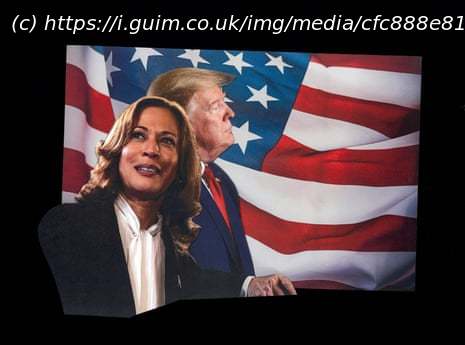The outcome could have profound implications for the wars in Gaza and Ukraine as well as the climate crisis
America’s moment of reckoning has arrived. On Tuesday, the nation will hold a presidential election like none before, poised between the historic candidacy of a Black woman and a former president branded a fascist by his own former officials.
Democrat Kamala Harris and Republican Donald Trump spent the weekend barnstorming swing states, aware that opinion polls show them running neck-and-neck in the race for the White House. Analysts are predicting the closest election since 2000, when George W Bush prevailed by 537 votes, and warning of the threat of civil unrest and political violence.
“This time, I venture to say, is a real Armageddon election,” John Zogby, an author and pollster, told reporters at the Foreign Press Centers in Washington. “Honestly, I’m not entirely sure that elements of either side of the electorate are willing to accept the results if their candidate does not win.”
The contest is also being watched intently around the world, with victory for Harris likely to represent a continuation of US foreign policy norms but a win for Trump threatening to upend them. The outcome could have profound implications for the wars in Gaza and Ukraine as well as the climate crisis.
Harris has been joined by independents and former Republicans in warning that US democracy itself is on the line. They have sought to remind the electorate that it was only four years ago that Trump instigated a coup against his own government, on 6 January 2021, in a desperate bid to cling to power.
Mark Milley, a former chair of the joint chiefs of staff, has described Trump as “a fascist to the core”. John Kelly, who was Trump’s chief of staff at the White House, has told how the president spoke admiringly of Adolf Hitler’s generals.
Trump has, if anything, reinforced the point in recent weeks by making ominous comments about “the enemy from within”, threatening to deploy the military domestically and staging a bigotry-filled rally in New York’s Madison Square Garden that echoed a Nazi one held there in 1939.
Yet still tens of millions of voters are set to back him, accepting his argument that they were better off four years ago than now. Trump has declared: “On issue after issue, Kamala broke it, but I will fix it.” Harris, for her part, has countered: “It’s either Donald Trump in there stewing over his enemy’s list, or me, working for you, checking off my to-do list.”
The election is the most expensive ever, with Democratic campaigns and outside groups having spent about $4.5bn on ads as of last week, compared with about $3.5bn for Republicans. It is focused on seven swing states that will decide the all-important electoral college: Arizona, Georgia, Michigan, Nevada, North Carolina, Pennsylvania and Wisconsin.
The contest also represents a vast experiment in the world’s powerful democracy. Harris, 60, would become the first woman, first Black woman and first person of south Asian descent to serve as president in the nation’s 248-year history if she wins.
She is up against a 78-year-old white man who has been accused of sexual assault by more than two dozen women, and whose campaign has embraced old-fashioned machismo and “bro culture” in search of votes.
Tara Setmayer, a former Republican communications director on Capitol Hill, said: “The approach of leaning into a toxic masculinity-themed campaign at a time when women’s rights are literally under assault in America is indicative of the absolute regressive and draconian worldview that Donald Trump brings to politics. They have doubled and tripled down on it, appealing to the worst instincts and lowest common denominator in the country.”
Last week, Trump said he would be a protector of women “whether the women like it or not”, prompting fierce backlash. Such flashpoints have exposed a historic gender gap in the electorate. In the latest USA Today/Suffolk University national poll, women backed Harris 53% to 36%, while men supported Trump 53% to 37%.
Elaine Kamarck, a senior fellow in governance studies at the Brookings Institution thinktank in Washington, said: “The population that is really pissed off is women. I mean really, really, really. The anger that women feel towards this guy is immense and it’ll show up in this election.”
She added: “The story of this election is the massive gender gap and it’s for three reasons. One is that there’s a woman candidate.






